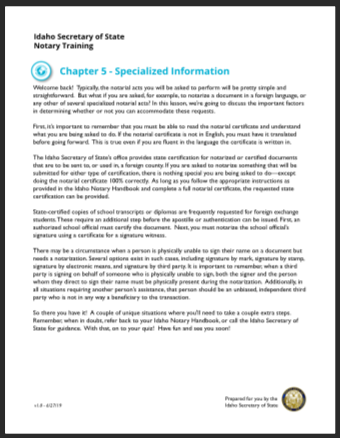Idaho Secretary of State
Notary Training
![]()
Training Video
Training Transcript
 Chapter 5 – General Information
Chapter 5 – General Information
Welcome back! Typically, the notarial acts you will be asked to perform will be pretty simple and straightforward. But what if you are asked, for example, to notarize a document in a foreign language, or any other of several specialized notarial acts? In this lesson, we’re going to discuss the important factors in determining whether or not you can accommodate these requests.
First, it’s important to remember that you must be able to read the notarial certificate and understand what you are being asked to do. If the notarial certificate is not in English, you must have it translated before going forward. This is true even if you are fluent in the language the certificate is written in.
The Idaho Secretary of State’s office provides state certification for notarized or certified documents that are to be sent to, or used in, a foreign county. If you are asked to notarize something that will be submitted for either type of certification, there is nothing special you are being asked to do—except doing the notarial certificate 100% correctly. As long as you follow the appropriate instructions as provided in the Idaho Notary Handbook and complete a full notarial certificate, the requested state certification can be provided.
State-certified copies of school transcripts or diplomas are frequently requested for foreign exchange students. These require an additional step before the apostille or authentication can be issued. First, an authorized school official must certify the document. Next, you must notarize the school official’s signature using a certificate for a signature witness.
There may be a circumstance when a person is physically unable to sign their name on a document but needs a notarization. Several options exist in such cases, including signature by mark, signature by stamp, signature by electronic means, and signature by third party. It is important to remember, when a third party is signing on behalf of someone who is physically unable to sign, both the signer and the person whom they direct to sign their name must be physically present during the notarization. Additionally, in all situations requiring another person’s assistance, that person should be an unbiased, independent third party who is not in any way a beneficiary to the transaction.
So there you have it! A couple of unique situations where you’ll need to take a couple extra steps. Remember, when in doubt, refer back to your Idaho Notary Handbook, or call the Idaho Secretary of State for guidance. With that, on to your quiz! Have fun and see you soon!
v1.0 – 6/27/19


